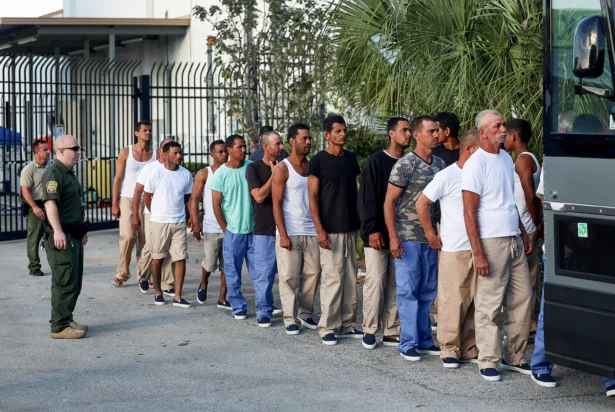A federal judge in Florida who temporarily blocked part of a statewide law criminalizing anyone who transports illegal immigrants into the state has backtracked on his ruling just one day later.
In a supplemental order issued Thursday, Judge Roy Altman of the Southern District of Florida questioned whether his initial order on Wednesday had been too broad.
“On further reflection, and given the ‘national conversation taking place in both the legal academy and the judiciary concerning the propriety of courts using universal injunctions as a matter of preliminary relief,’ we now invite further briefing on the proper scope of the injunction,” the judge wrote.
The judge then went on to invite the lawyers in the case to submit a brief making their arguments on the question of whether the earlier injunction should apply by June 6.
The supplemental order came after Judge Altman—who was appointed as a judge in the federal Southern District of Florida by President Donald Trump—temporarily blocked part of Florida’s anti-illegal immigration legislation, Senate Bill 1718, on Wednesday.
In court filings, the judge wrote that the provision in question “extends beyond the state’s authority to make arrests for violations of federal immigration law, and in doing so, intrudes into territory that’s preempted.”
The legislation in question was signed by Florida Gov. Ron DeSantis a year ago at a time when the southern border states were widely anticipating an uptick in illegal immigrants following the scheduled expiration of the public health order, Title 42.
Bill Needed to Combat ‘Reckless Border Policies’
Specifically, the bill contains provisions that amend the crime of human smuggling to make it a third-degree felony for anyone who “knowingly and willfully” transports into the state “an individual whom the person knows or reasonably should know has entered the United States in violation of the law and has not been inspected by the Federal Government since his or her unlawful entry from another country.”
At the time, Mr. DeSantis said the legislation was needed to “combat the dangerous effects of illegal immigration caused by the federal government’s reckless border policies.”
However, the measure quickly became the subject of a lawsuit filed by The Farmworker Association of Florida, Inc., a non-profit, farmworker membership organization with more than 10,000 members.
In their lawsuit, the organization argued the measure was unconstitutional and that Florida was illegally attempting to unilaterally regulate federal immigration and subject people to criminal punishment without fair notice.
The lawsuit listed Mr. DeSantis, Attorney General Ashley Moody, Florida Statewide Prosecutor Nicholas B. Cox, and the attorneys general for all 20 Florida Judicial Circuits as defendants.
The legal challenge was also backed by the American Civil Liberties Union, ACLU of Florida, Americans for Immigrant Justice, American Immigration Council, and the Southern Poverty Law Center.
In issuing the preliminary injunction Wednesday, Judge Altman cited previous federal court rulings that he said established immigration-related matters should be governed by federal law and not state law.

Advocacy Groups Welcome Initial Ruling
“By making it a felony to transport into Florida someone who ‘has not been inspected by the federal government since his or her unlawful entry,’ Section 10 (the section of the law being challenged) extends beyond the state’s authority to make arrests for violations of federal immigration law and, in so doing, intrudes into territory that’s preempted,” the judge wrote.
The judge also noted his injunction was meant to apply statewide.
“In this case, any harm the state may suffer from an injunction is overweighed by the harm [the provision] poses both to the Plaintiffs and to the United States, which has the ultimate interest in protecting federal supremacy in the realm of immigration,” he wrote in his initial order.
Following his initial decision, advocacy groups and lawyers celebrated the ruling, with Emma Winger, deputy legal director of the American Immigration Council, stating that the ruling “means freedom from fear and increased safety for families and communities of color in Florida.”
Elsewhere Amien Kacou, staff attorney with the ACLU of Florida called Judge Altman’s initial decision “a much-needed win for Floridians,” adding that “for too long, our state has imposed a barrage of anti-immigrant laws and policies that harm citizens and noncitizens alike.”
The Epoch Times has reached out to both the Farmworkers Association of Florida and the Florida Attorney General’s office for comment.
Bill Pan contributed to this report.
From The Epoch Times

